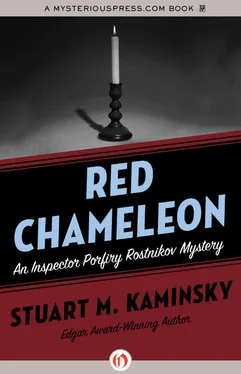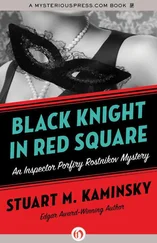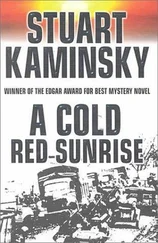Stuart Kaminsky - Red Chameleon
Здесь есть возможность читать онлайн «Stuart Kaminsky - Red Chameleon» весь текст электронной книги совершенно бесплатно (целиком полную версию без сокращений). В некоторых случаях можно слушать аудио, скачать через торрент в формате fb2 и присутствует краткое содержание. Год выпуска: 2012, ISBN: 2012, Издательство: MysteriousPress.com/Open Road, Жанр: Полицейский детектив, на английском языке. Описание произведения, (предисловие) а так же отзывы посетителей доступны на портале библиотеки ЛибКат.
- Название:Red Chameleon
- Автор:
- Издательство:MysteriousPress.com/Open Road
- Жанр:
- Год:2012
- ISBN:978-1-4532-6632-8
- Рейтинг книги:4 / 5. Голосов: 1
-
Избранное:Добавить в избранное
- Отзывы:
-
Ваша оценка:
- 80
- 1
- 2
- 3
- 4
- 5
Red Chameleon: краткое содержание, описание и аннотация
Предлагаем к чтению аннотацию, описание, краткое содержание или предисловие (зависит от того, что написал сам автор книги «Red Chameleon»). Если вы не нашли необходимую информацию о книге — напишите в комментариях, мы постараемся отыскать её.
Red Chameleon — читать онлайн бесплатно полную книгу (весь текст) целиком
Ниже представлен текст книги, разбитый по страницам. Система сохранения места последней прочитанной страницы, позволяет с удобством читать онлайн бесплатно книгу «Red Chameleon», без необходимости каждый раз заново искать на чём Вы остановились. Поставьте закладку, и сможете в любой момент перейти на страницу, на которой закончили чтение.
Интервал:
Закладка:
“Busy,” growled the stubble-faced driver whose curly gray hair billowed around his face. He did not bother to turn toward the two men.
“Police,” said Zelach, getting in and sliding over.
“I’m still-” the driver said wearily, without turning.
Rostnikov reached over after he got in and put his hand on the driver’s shoulder.
“What is your name?”
The man winced in pain and turned to face his two passengers. Fear appeared in his eyes.
“I–I thought you were lying,” the man said, the smell of fish on his breath. “Smart city people say they are everything to get a cab. I’m supposed to wait here each day for Comrade-”
“Yekteraslav,” Rostnikov said, releasing the man so he could massage his shoulder.
“But I-” the man protested.
Rostnikov was already leaning back in the uncomfortable seat with his eyes closed. He would massage his leg as soon as the man started.
“Yekteraslav,” Zelach repeated, looking out the window.
The driver looked at his two passengers in the mirror and decided against argument.
Fifteen minutes later, after rumbling over a stone road in need of repair, the driver grumbled, “Yekteraslav.”
Rostnikov opened his eyes and looked out the window at a looming three-story factory belching smoke on the town’s thirty or forty houses and sprinkling of isbas, the old wooden houses without toilets.
“Where?” the driver said.
“Police headquarters,” Zelach said.
The driver hurried on.
The bureaucracy of the local police delayed them for half an hour and did little to ease their way to the home of Yuri Pashkov. To say the home was modest would be kind. It was little better than a shack with a small porch on which an ancient man was seated on a wooden chair, watching, as the two heavy policemen ambled forward. The sad-faced younger man deferred to the slightly older man with the bad leg. Yuri was intrigued by the older man, but he showed nothing.
“You are Yuri Pashkov?” Zelach asked.
“I am well aware of who I am,” the old man said, looking away at the fascinating spectacle of the factory.
“Would you rather have this conversation at the police station?” Zelach said, stepping onto the porch. Yuri shrugged and looked up at the man.
“You want to carry me to police headquarters, carry me,” the old man said.
“Your tongue will get you in trouble,” Zelach warned, falling back on the threats of his trade.
“Ha,” Yuri cackled. “I’m eighty-five years old. What have you to threaten me with? My family is gone. This shack is a piece of shit. Threaten. Go ahead. Threaten.”
Rostnikov stepped up on the small porch into the slight shade from the wooden slats above.
“What kind of factory have you here?” he said.
“Vests.”
Rostnikov glanced at the old man in the chair. The lines on his face were amazingly deep and leathery.
“Vests?” Rostnikov asked, sensing the man’s favorite subject.
“Vests,” the old man said, pausing to spit into the dirt near Zelach, who stepped back. “We used to farm around here, and now they have us working in a factory, and what do we make in that factory?”
“Vests,” said Rostnikov.
“Exactly,” said Yuri, recognizing a kindred spirit. “What dignity is there in a man’s life when he has spent it sewing buttons on vests to be worn by Hungarians or Italians.”
“None,” Rostnikov agreed.
“None,” Yuri said. “And so they make vests without heart, spirit, need. You know what kind of vests they make?”
“Vests of poor quality,” Rostnikov guessed, glancing at Zelach, who clearly ached to shake the old rag of a man into a cooperation that would never come.
“Vests of paper, toilet paper, vests not fit to wipe one’s ass with,” the old man said with venom, spit forming on his mouth, eyes turned always toward the factory.
“It wasn’t always like this,” Rostnikov said softly.
“There were times,” the old man said.
“Long ago,” Rostnikov agreed.
“Long ago,” Yuri agreed.
“I understand you remember a man named Abraham Savitskaya who was here a long time ago,” Rostnikov said, not looking at the man.
“I don’t remember.”
Zelach stepped forward, whipped the photograph from his pocket, and thrust it in front of the wrinkled face.
“That,” said Zelach, “is you. And that is Savitskaya.”
“And you are Comrade Shit,” the old man said sweetly.
“Zelach,” Rostnikov said firmly before the sweating, weary policeman could crush the dry old man. “Walk back to the police station, arrange for a car to get us to the station in time to catch the next train.”
Zelach’s face displayed a rush of thought: first the consideration of defiance and then its quick suppression, followed by petulance, and finally resignation.
When Zelach had gone, Rostnikov leaned against the wall and said nothing.
“What happened to your leg?”
“Battle of Rostov,” Yuri said. “I still have poison gas in my lungs. I can taste it when I belch.”
They watched the factory a while longer before the old man spoke again.
“Some didn’t stay around to face the troubles, the Germans, the Revolution.”
“Some?” Rostnikov tried gently.
“Savitskaya,” he said. “Savitskaya and Mikhail.”
“Mikhail?”
“Mikhail Posniky,” the old man said. “After the first Revolution, they fled.”
“Mikhail Posniky is the third man in the photograph?”
Yuri shrugged, the closest he would come to cooperation.
“What happened to him?”
“They left, said they were going to America. Who knows? We were supposed to be friends, but they ran like cowards.”
“They should have stayed,” Rostnikov agreed.
“To make vests?” said the old man.
“To fight the Nazis,” Rostnikov answered.
“Who knew in 1920 the Nazis were coming?” the old man said, looking at his feebleminded police guest.
“Who knew?” Rostnikov agreed. “And the fourth man?”
Pashkov shrugged and shivered. “I don’t know.”
Rostnikov was sure, however, that the man did know. His face had paled, and he had folded his hands on his lap. His arthritic fingers had held each other to keep from trembling.
“You are Jewish,” Rostnikov said.
“Ah,” Yuri said, laughing. “I knew it was coming. It always comes. I fought. This village fought. And you people come and-”
“The four of you were Jewish?” Rostnikov said, stepping in front of the old man and cutting off his view of the factory.
“Some of us still are,” Pashkov said defiantly. “Those of us who are alive, at least one, me.” He pointed a gnarled finger at his own chest.
“The fourth man,” Rostnikov repeated. “Who is he?”
“I forget,” Pashkov said, showing yellow teeth barely rooted to his gums.
“You forget nothing,” Rostnikov said, looking down.
“I forget what I must forget. I’m a very old man.”
“A name,” Rostnikov said, and then softly added, “My wife is Jewish.”
“You lie, comrade policeman,” the old man said.
Rostnikov reached into his back pocket with a grunt, removed his wallet, and fished through it till he found the picture of Sarah and his identification papers. He handed them to the old man.
“You could have prepared these just to fool me?” he said, handing the photograph and papers back to the man who blocked his view of the loved and hated factory.
“I could have,” Rostnikov agreed. “But I didn’t, and you know I didn’t.”
“I know,” Pashkov said, painfully rising, using the side of the house to help him to a level of near dignity. “He was not a pleasant boy.”
“And you are afraid?”
Читать дальшеИнтервал:
Закладка:
Похожие книги на «Red Chameleon»
Представляем Вашему вниманию похожие книги на «Red Chameleon» списком для выбора. Мы отобрали схожую по названию и смыслу литературу в надежде предоставить читателям больше вариантов отыскать новые, интересные, ещё непрочитанные произведения.
Обсуждение, отзывы о книге «Red Chameleon» и просто собственные мнения читателей. Оставьте ваши комментарии, напишите, что Вы думаете о произведении, его смысле или главных героях. Укажите что конкретно понравилось, а что нет, и почему Вы так считаете.












